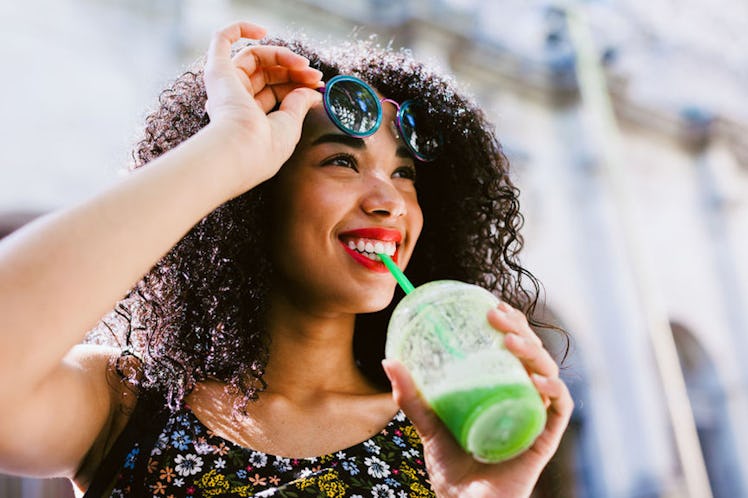
The One Vitamin You Need To Make Sure You're Getting If You Just Went Vegan
When I began my transition to a vegan diet, my biggest concern was about eating enough protein. After easily falling in love with a number of tempeh, bean, and tofu recipes, though, I knew protein wasn't going to be a big issue for me. However, addressing some of the other major vitamins and nutrients in my new diet was a bit more challenging. According to experts, what every vegan should know about vitamin B12 is that it can be a bit harder to come by in a plant-based diet than other vitamins and nutrients, but rest assured, it's not impossible.
"B12 is one of the main nutrients I would suggest supplementing if eating a vegan diet," Dr. Ariana Lutzi, ND, a naturopathic doctor, nutrition consultant for BUBS Naturals, and co-founder of Paix Medicine, tells Elite Daily in an email. The good news, though, is you can definitely find B12 in plenty of plant-based sources like nutritional yeast, soy products, and plant-based milks. Just make sure these foods are fortified with B12 before relying on them to satisfy your nutritional requirements, Lutzi says.
Now, you might think B12 is just some random vitamin out of several vitamins and nutrients your body needs to thrive, and while that's technically sort of true, you're bound to notice the difference when your body isn't getting enough of the stuff. For example, according to the National Institutes of Health's Office of Dietary Supplements (ODS), a vitamin B12 deficiency can make you feel tired, weak, constipated, and it can even cause you to lose your appetite.
Unfortunately, as the ODS explains, "only animal foods have vitamin B12 naturally," which means you do have to be a bit more thoughtful and creative about how you include the vitamin in your vegan diet. Again, anything that says "fortified with vitamin B12" is good to grab in the grocery store, as are meat substitutes like tofu and tempeh. Of course, you can also take a daily vitamin B12 supplement if you really want to make sure you're not skimping on the stuff.
In addition to vitamin B12, Dr. Lutzi says it's also important to make sure you're getting enough iron and zinc in your vegan diet. While grains and legumes can be a great source of nutrients, she says they also contain compounds that can block the benefits and absorption of certain vitamins and minerals such as zinc. To combat this, if you want to focus on fresh plant foods to get your iron in, help your body absorb it properly by cooking your food in a cast iron skillet and squeezing some lemon or lime on top of your dish, Lutzi recommends, because vitamin C will help your body absorb the iron.
See, the thing about iron is, even when you were still eating meat, you may have been iron-deficient without even realizing it, according to Erin Stokes, ND, medical director of MegaFood, who says one in 10 women in the United States are at risk for low iron levels. "Symptoms of iron deficiency can include fatigue, decreased focus, and an inability to stay warm," Stokes tells Elite Daily over email. If you decide to opt for an iron supplement to be extra sure you're getting everything you need, Stokes recommends choosing one that's created from natural ingredients. Specifically, for a new vegan, Stokes suggests the MegaFood Blood Builder supplement, which is made from foods like beets and oranges, and is designed to support folic acid, B12, and iron.
If you're not really a supplements person, though, Bryan Baia, a coach at Athlete Training Club, a Precision Nutrition coach, and ACSM-certified personal trainer, says another way to ensure you're getting all the vitamins and nutrients you need is to add wheatgrass to your diet. "Wheatgrass is an excellent way to make sure you’re getting in the important nutrients that can be missed without animal products such as iron and zinc," he explains in an email to Elite Daily.
Of course, if you haven't tried the, uh, actual grass before, you might be confused about how exactly to add it into your daily routine. Fortunately, you don't have to eat the stuff straight; the nutrient-dense food is often mixed into juices or smoothies, according to Mayo Clinic. And, speaking from personal experience, banana and almond butter can go a long way in masking the taste of wheatgrass in a smoothie.
All in all, don't let this list of suggestions overwhelm you; you'll find your groove in your new diet soon enough. Start off by making sure you're all set with vitamin B12, and then you can gradually shift your diet to be full of all of the other good stuff, too. Pro tip from one vegan to another: Just one serving of these Free2B vegan dark chocolate cups contains 15 percent of your daily recommended iron intake — and they taste spectacular.